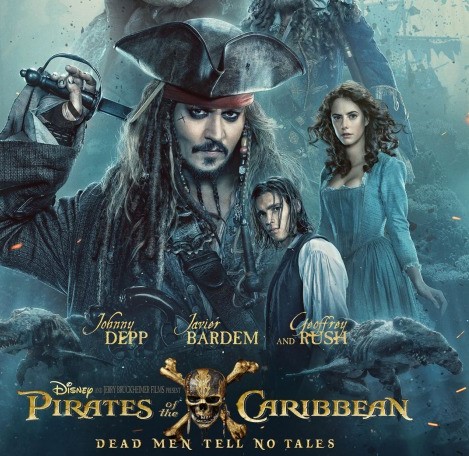Reminding myself that the Pirates of the Caribbean film franchise was inspired by a theme-park ride is useful. As a writer of historical fiction, I find myself enjoying the movie much more. Such is the case for the fifth installment of the series Pirates of the Caribbean: Dead Men Tell No Tales where fine acting and first class special effects shoulder most of the burden for creating an entertaining film. The caliber of the actors and producers, however, suggest this movie had much more potential than what was delivered on the big screen.
Multiple story lines bog down the plot in Dead Men Tell No Tales, and many viewers will find the story hard to track. New characters are introduced on top of a cast that had already expanded under the first three films. Dead Men Tell No Tales sequentially follows the third film (At World’s End), complicating matters, because the fourth film (On Stranger Tides) was a “one-off.” The story tried to capitalize on the popularity of Jack Sparrow and his crew independently of the established story line in the first three films, creating a nonlinear break in the story.
Dead Men Tell No Tales picks up with a young Henry Turner (Brenton Thwaites, The Giver, Gods of Egypt), the child of Elizabeth Swan (Kiera Knightley, Bend it Like Beckham, Pride and Prejudice) and Will Turner (Orlando Bloom, Curse of the Black Pearl, Troy, Lord of the Rings) on a quest to find the Trident of Poseidon, which legend holds will break all the curses of the sea including his father’s. Jack Sparrow (Johnny Depp, Curse of the Black Pearl, Platoon, Edward Scissorhands) holds the key to finding the trident through his bewitched compass, which will reveal the location of its owner’s most prized object. Through a series of comedic mishaps, Henry discovers and joins forces with Carina Smyth (Kaya Scodelario, Maze Runner, Wuthering Heights), who also happens to be searching for the trident to vindicate her father’s scientific calculations left to her in a diary. Corina, however, is about to be hanged as a witch because no one believes her scientific ruminations as a brilliant astronomer.
When Jack Sparrow gives up his compass for a drink in a local tavern, a crew of undead Spanish Navy sailors led by Captain Armando Salazar (Javier Bardem, No Country for Old Men, Skyfall, Before Night Falls) are released to continue their quest to rid the seas of pirates. This puts Captain Barbossa‘s (Geoffrey Rush, The King’s Speech, The Book Thief, Life and Death of Peter Sellers) pirate fleet in jeopardy. Barbossa is captured by Salazar, and his life is saved only when he relents to find Jack Sparrow. Everyone is now on the quest to find the Trident of Poseidon—Henry Turner to release his cursed father from the Flying Dutchman, Corina Smyth to prove her scientific brilliance, Barbossa to retain his power over the seas, and Salazar install himself as lord over the seas.
Keeping all this straight in difficult, and Dead Men Tell No Tales is prone to dialogue that fills in details and background for the audience (a classic case of Show Don’t Tell) with predictable results—slowing down the action. This is a problem because the Pirates of the Caribbean films are built on action sequences that include protracted sword fights, running duels among pirate ships and their pursuers, and chases through towns and jungles. Dead Men Tell No Tales has those scenes—one in particularly has Jack Sparrow dodging a ghost’s attempt to skewer him with a pike as he jumps from cannon to cannon between Bardem’s ship and the resurrected Black Pearl.
Juggling so many characters and story lines creates challenges for directors in a format as structured as film, where the the entire story must take place in a 2-3 hour window. Few characters really have a chance evolve. Henry Turner stays the same brash, precocious young man throughout the movie, although he falls in love with Corina. Salazar stays the same revenge and hate-filled pirate hunter. Corina becomes slightly less headstrong. While Will Turner and Elizabeth Swan make an appearance, but their time on the screen is not long enough to have a meaningful impact on the plot except to set up a sixth film. (Hint: stay seated through the final credits.) The lone exception is Barbossa whose hardcore piratical worldview sets up a personal dilemma that forces him to make a tragic but noble choice—and let’s Geoffrey Rush show his experienced acting chops.
Thus, the plot fails to bring much fresh to the story. The characters come off as flat despite excellent acting by the entire cast. (Even the brief part played by and credited to Paul McCartney—perhaps the only time a beetle is welcome on a wooden ship—was well done and, for me, worth the movie theater ticket price.) Dead Men Tell No Tales’ special effects, particularly those applied to the renderings of Salazar and his crew and the final battle for the trident, are also state of the art, so don’t be surprised to see a few technical Oscar nods to this movie next year.
Nevertheless, Pirates of the Caribbean: Dead Men Tell No Tales is an entertaining film that stays well within the framework and spirit of the first three films in the franchise.
